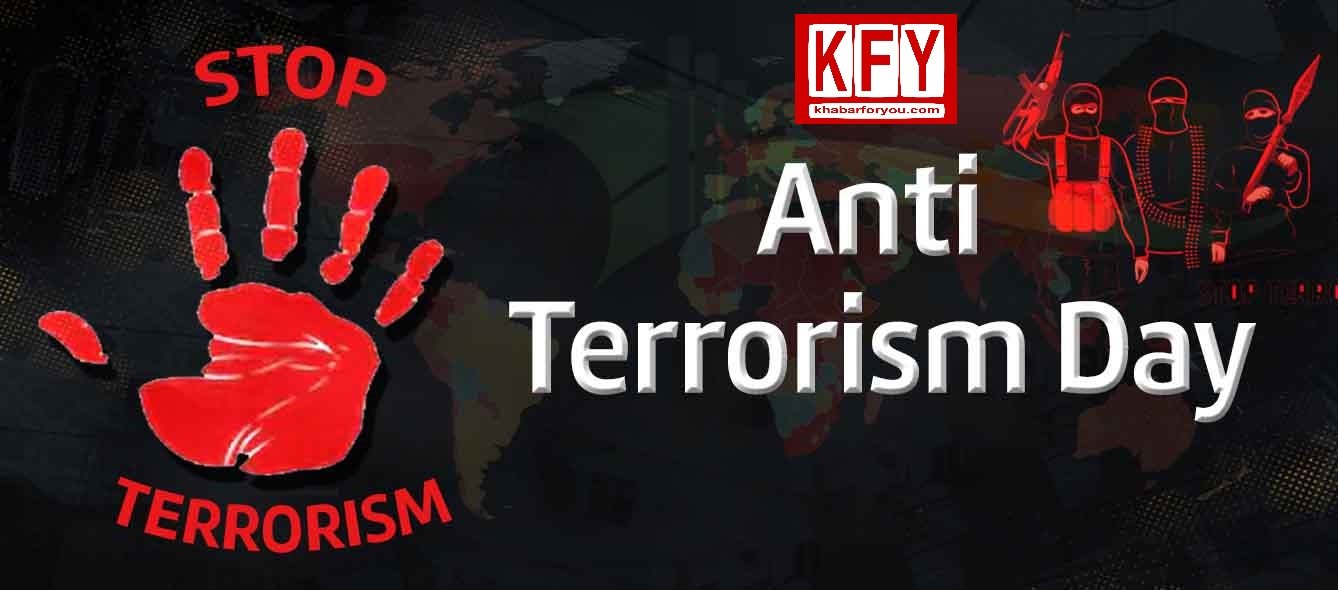Anti-Terrorism Day in India: History and Vigilance #AntiTerrorismDay #India #Vigilance #RajivGandhi

- DIVYA MOHAN MEHRA
- 21 May, 2025
- 102585

Email:-DMM@khabarforyou.com
Instagram:-@thedivyamehra


Every year on 21 May, India observes National Anti-Terrorism Day – the death anniversary of former Prime Minister Rajiv Gandhi. Gandhi was assassinated by a suicide bomber of the Tamil Tiger (LTTE) organisation on 21 May 1991 while campaigning in Tamil Nadu. In the aftermath, the government declared 21 May as Anti-Terrorism Day “to raise awareness among people about terrorism”
Read More - एलएसजी के स्टार खिलाड़ी दिग्वेश राठी को बीसीसीआई ने आचार संहिता के कई उल्लंघनों के कारण निलंबित कर दिया है।
The day is marked by commemorating Rajiv Gandhi’s vision of peace and by reiterating the nation’s resolve against terrorism. It is an occasion for citizens and officials to remember the victims of terrorism and to renew a collective pledge to oppose violence. India’s Anti-Terrorism Day has a clear theme of unity and vigilance. It is typically marked by wreath-laying ceremonies at Rajiv Gandhi’s memorial and by public pledges against violence. Events and media features emphasize that terrorism is a continuing threat to the country’s unity. For example, NDTV notes that the day “honour [s] the sacrifices of thousands of security personnel in the fight against terrorism” and serves as “a reminder that terrorism is still a massive threat to unity and peace”
Organizations and schools often hold seminars and awareness drives, educating people how to act as a “force multiplier” for law enforcement by staying alert and reporting suspicious activities. On Anti-Terrorism Day, Indian citizens also recite an official pledge. The Home Ministry’s pledge begins: “We, the people of India, having abiding faith in our country’s tradition of non-violence and tolerance, hereby solemnly affirm to oppose with our strength all forms of terrorism and violence. We pledge to uphold and promote peace, social harmony…”
This public commitment reinforces the idea that countering terror is a national responsibility. In this way, the day promotes solidarity and reminds every Indian that peaceful coexistence and vigilance go hand in hand.
Cross-Border Terrorism Threats
India faces persistent cross-border terrorism threats from neighboring regions. Key sources of concern include:
-- Pakistan: India has long accused Pakistan of harboring and sponsoring terrorist groups that target Indian citizens. In recent years Pakistan-trained militants – notably Lashkar‑e‑Taiba (LeT) and Jaish‑e‑Mohammed (JeM) – carried out deadly attacks such as the 2019 Pulwama bombing and the April 2025 Pahalgam massacre. India’s Foreign Secretary has remarked that each attack “ties in with Pakistan’s long track record of perpetrating cross-border terror in India,” and has noted Pakistan’s reputation as a “haven for terrorists” . Observers have pointed out that Pakistan’s well equipped military still hosts jihadist groups like LeT and JeM, and urged Islamabad to “shut down” these organisations to avoid fresh India–Pakistan confrontations .
-- Bangladesh: India and Bangladesh share an open border in the East, and authorities remain on guard against any militant spillover. Recently, political unrest in Bangladesh has led Indian leaders to warn that militants should not exploit the situation. Assam Chief Minister Himanta Biswa Sarma cautioned that Bangladesh “must not become a safe haven” for terrorists . He noted that in the past Bangladesh cooperated in removing insurgent bases in its territory, and stressed the importance of coordination to prevent any revival of cross-border extremism. The Indian government also maintains close security cooperation with Dhaka to track and interdict radical groups that might threaten India’s northeast.
-- Myanmar (and Northeast India): India’s long, porous border with Myanmar has been used by insurgent groups from the Northeast. Militants from states like Nagaland, Manipur and Assam have historically sought refuge or training in Myanmar. According to government data, 563 insurgents were apprehended (and 47 killed) along the India–Myanmar border during 2015–2018 . India has therefore deployed the Assam Rifles and enhanced surveillance on this frontier. Operations in recent years (often in coordination with Myanmar’s military) have targeted militant camps across the border to choke off safe havens. These measures reflect the ongoing risk that Northeast insurgents can use neighbouring territory as a base.
-- Other neighbors: In contrast, the India–China Himalayan border has seen virtually no terrorist infiltration , given its harsh terrain and heavy military presence. The India–Nepal and India– Bhutan borders are open but are patrolled by security forces. (For example, one Pakistani terrorist was arrested crossing into Uttar Pradesh from Nepal in 2017 .) In short, India’s main cross-border terror threats today come from the west (Pakistan) and east (Bangladesh/Myanmar), and India keeps these borders under constant watch.
India’s Response: Laws, Operations, and Cooperation
In response to these threats, India has taken comprehensive measures – legal, military, intelligence and diplomatic – to protect its citizens and strike at terrorism:
-- Stronger laws and agencies: India continuously toughens its legal framework against terror. The National Investigation Agency (NIA) was created in 2009 as a federal counter-terrorism agency (in the wake of the 2008 Mumbai attacks) . The NIA Act and related laws empower it to investigate terror offences affecting India’s security. In 2019, Parliament amended the UAPA (Unlawful Activities [Prevention] Act) to expand these powers: for the first time the government was allowed to designate individual persons (not just groups) as terrorists . The 2019 amendments also let the NIA pursue cases of Indian interest abroad . Special anti-terror courts have been set up in major cities, and specialized units (e.g. for cyber-terrorism and terror financing) have been created within the NIA . These legal measures give India tools to arrest, detain and prosecute terrorists and their backers in a coordinated manner.
-- Security and military action: India’s security forces remain vigilant at home and ready to act against terrorist cells. Counter-insurgency and counter-terror operations are routinely conducted in Jammu & Kashmir and the Northeast to flush out militants. Abroad, India has demonstrated a willingness to act decisively. In May 2025, for instance, India launched “Operation Sindoor”: early morning airstrikes on multiple terrorist hideouts in Pakistan-administered Kashmir and Pakistan itself. The strikes – the first time India hit targets across the India–Pakistan international border since 1971 – were in retaliation for the 22 April 2025 Pahalgam massacre. The official account noted that the raids hit nine locations associated with Lashkar-e-Taiba and other groups . (Prime Minister Modi later described this as India’s strong commitment to justice.) Earlier examples include the 2016 “surgical strikes” into Pakistani-held territory after an attack on Indian soldiers, and the 2019 airstrike on a Jaish-e-Mohammed training camp in Balakot. These actions serve both to destroy terror infrastructure and to deter future attacks.
-- Intelligence and counter-finance: India invests heavily in intelligence gathering and sharing. Domestic agencies (the IB, R&AW, NIA, etc.) work closely to track terror networks, finance flows and online propaganda. The NIA’s remit now explicitly includes terror financing: for example, a Terror Funding and Fake Currency cell has been formed to trace and freeze funds used by militants . India also harnesses technology and big data – for instance, by creating a National Data Fusion and Analysis Centre – to improve surveillance. These steps help interdict plots before they can materialize. On Anti-Terrorism Day, officials often encourage citizens to report suspicious activity, reinforcing that a vigilant public can aid security forces as a “force multiplier.”
-- International cooperation: India has used diplomacy to build a united front against cross-border terrorism. It actively raises Pakistan-backed terror groups at the United Nations and other forums. For example, in 2024 India submitted intelligence to the UN Security Council’s Al-Qaida Sanctions Committee naming a Pakistan-origin “front” organisation used by Lashkar-e-Taiba . It also works bilaterally and in multilateral groups (like the Global Counter-Terrorism Forum) to improve intelligence-sharing with allies. After operations like Operation Sindoor, India briefed key partners (US, UK, Middle Eastern allies) on the strikes. The Indian Embassy in Washington emphasized that these strikes were “focused and precise” – “measured, responsible” actions targeting only known terror camps . By communicating clearly, India seeks international support and understanding. Many global leaders and organisations routinely condemn attacks on India; for instance, immediately after the 2025 strike, the UN Secretary-General warned that “the world cannot afford a military confrontation” and urged restraint on all sides . In sum, India’s counter-terror strategy mixes firm security measures with active diplomacy, aiming to isolate terrorists and their supporters while building international consensus.
Moving Forward
Anti-Terrorism Day in India thus serves both as a memorial and a call to action. It reminds citizens that terrorism endangers our shared peace, and that every Indian has a role – through vigilance, cooperation and communal harmony – in resisting violence. By understanding the history of this observance and the real threats India faces, people can appreciate why unity and alertness are vital. Through tough laws, determined security operations and global cooperation, India continues to counter terrorism. But as the day’s pledge emphasizes, success ultimately depends on “the people of India” standing together to uphold peace and social harmony .
Business, Sports, Lifestyle ,Politics ,Entertainment ,Technology ,National ,World ,Travel ,Editorial and Article में सबसे बड़ी समाचार कहानियों के शीर्ष पर बने रहने के लिए, हमारे subscriber-to-our-newsletter khabarforyou.com पर बॉटम लाइन पर साइन अप करें। |
| यदि आपके या आपके किसी जानने वाले के पास प्रकाशित करने के लिए कोई समाचार है, तो इस हेल्पलाइन पर कॉल करें या व्हाट्सअप करें: 8502024040 |
#KFY #KFYNEWS #KHABARFORYOU #WORLDNEWS
नवीनतम PODCAST सुनें, केवल The FM Yours पर
Click for more trending Khabar


Leave a Reply
Your email address will not be published. Required fields are marked *
Search
Category







